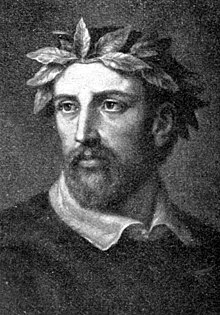Torquato Tasso
| Torquato Tasso | |
|---|---|

A depiction of Tasso from a German encyclopedia, 1905. Note the laurel crown.
|
|
| Born |
11 March 1544 Sorrento, Kingdom of Naples |
| Died | 25 April 1595 (aged 51) Rome, Papal States |
| Occupation | Poet |
| Genre | Epic poetry, lyric poetry |
Torquato Tasso (Italian: [torˈkwaːto ˈtasso]; 11 March 1544 – 25 April 1595) was an Italian poet of the 16th century, best known for his poem Gerusalemme liberata (Jerusalem Delivered, 1581), in which he depicts a highly imaginative version of the combats between Christians and Muslims at the end of the First Crusade, during the Siege of Jerusalem. He suffered from mental illness and died a few days before he was due to be crowned as the king of poets by the Pope. Until the beginning of the 20th century, Tasso remained one of the most widely read poets in Europe.
Born in Sorrento, Torquato was the son of Bernardo Tasso, a nobleman of Bergamo and an epic and lyric poet of considerable fame in his day, and his wife Porzia de Rossi, a noblewoman from Naples. His father had for many years been secretary in the service of Ferrante Sanseverino, Prince of Salerno, and his mother was closely connected with the most illustrious Neapolitan families. When the prince of Salerno came into collision with the Spanish government of Naples, being subsequently outlawed and deprived of his hereditary fiefs, Tasso's father shared his patron's fate. He was proclaimed a rebel to the state, together with his son Torquato, and his patrimony was sequestered. These things happened during the boy's childhood. In 1552 Torquato was living with his mother and his only sister Cornelia at Naples, pursuing his education under the Jesuits, who had recently opened a school there. The precocity of intellect and the religious fervour of the boy attracted general admiration. At the age of eight he was already famous.
...
Wikipedia
